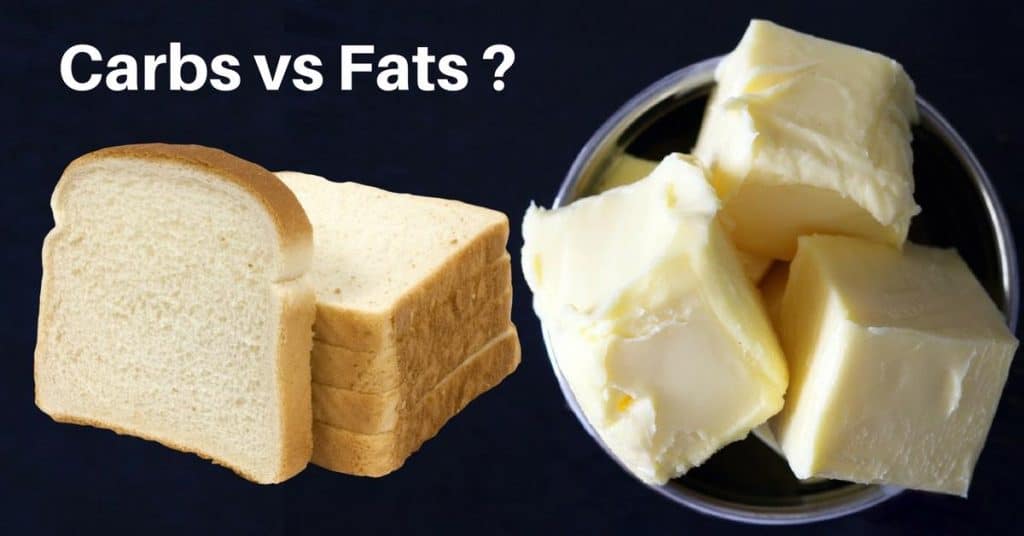How many times in your life have you heard that dietary fat is bad for you and your body? From concerns related to obesity and cardiovascular diseases, just to name a few, dietary fat, also known as lipids, has long been considered a needed yet potentially dangerous component of our diets.
If you have been following a Low Carb High Fat diet you would agree that processed carbs and sugar are your enemy, not fat. In fact, refined carbs can cause even more metabolic damage than saturated fat (1).
A recently released study is now challenging the notion that fat is indeed the villain in our diets and redirecting the focus to carbohydrates.
This revolutionary study, the Prospective Urban-Rural Epidemiology (PURE) study, followed more than 135,000 individuals from 18 low, middle and high-income countries and ended up concluding that high carbohydrate intake is linked to worse total mortality and noncardiovascular (CV) mortality outcomes, while high fat intake is associated with lower risk (2).
As investigator Dr. Mahshid Dehghan, Ph.D., from the Population Health Research Institute at McMaster University later explained, “Our findings do NOT support the current recommendation to limit total fat intake to less than 30% of energy and saturated fat intake to less than 10% of energy.”
Could this mean a total rethinking of the current dietary guidelines is imminent?
Dr. Dehghan further explained, “Limiting total fat consumption is unlikely to improve health in populations, and a total fat intake of about 35% of energy with concomitant lowering of carbohydrate intake may lower risk of total mortality. In fact, individuals with high carbohydrate intake, above 60% of energy, may benefit from a reduction in carbohydrate intake and increase in the consumption of fats.”
The PURE Study
What is the PURE study exactly and how can scientists involved in this study be so adamant about its results?
First off, the study had an enormous pool of subjects, which included 135,335 individuals, aged 35 to 70 years, from countries in North America and Europe, South America, the Middle East, South Asia, China, South East Asia and Africa (3).
Second of all, the study did not focus solely on the health effects brought on by the consumption of carbohydrates vs the health effects brought on by the consumption of fats.
Instead, PURE analyzed the consumption of carbohydrate, total fat, and types of fat. On top of that, the study also used country-specific validated food frequency questionnaires, and associations were assessed between cardiovascular disease and mortality.
Carbohydrate vs total fat vs different types of fat
The results? With an average follow-up period of 7.4 years, among the 5,796 deaths and 4,784 major cardiovascular events, the researchers noted that carbohydrate intake in the highest versus lowest quintile was associated with a significant 28% increased the risk of total mortality, but not cardiovascular disease risk.
That means that while comparing the individuals consuming higher amounts of carbohydrates with those consuming smaller amounts, there was a 28% higher mortality risk within those individuals in the first group, with no changes in the risk of cardiovascular disease incidence.
But what does this study have to say about fat consumption? Researchers also found that total fat intake in the highest versus lowest quartile was associated with a significant 23% reduction in total mortality risk, an 18% reduced risk of stroke, and a 30% reduced risk of noncardiovascular disease-related mortality.
Each type of fat was associated with significantly reduced mortality risk:
- 14% lower for saturated fat;
- 19% for mono-unsaturated fat;
- 20% for polyunsaturated fat.
On top of results related to mortality risk, it was also found that higher saturated fat intake was associated with a 21% decrease in stroke risk.
PURE researchers also came to another conclusion regarding the low consumption of fats:
“We found no evidence that below 10 percent of energy by saturated fat is beneficial, and going below 7 percent may even be harmful. Moderate amounts, particularly when accompanied with lower carbohydrate intake, are probably optimal,”
LDL vs HDL
What is perhaps unique to this study (apart from its results) is the thoroughness followed by the researchers.
Apart from studying the relations mentioned above, the study took another step towards clarity, also examining the impact of fats and carbohydrates on blood lipids in the same PURE study participants.
Consistent with other previous studies, it was found that with higher intakes of saturated fat, both LDL and HDL levels in the blood increase. Since LDL (known as the “bad cholesterol”) and HDL (known as the “good cholesterol”) both increase, the net effect is a decrease in the total cholesterol/HDL ratio.
Although this particular finding in the study is not in any way revolutionary, PURE researchers also found that LDL cholesterol, which is used as the basis of many dietary guidelines, is not reliable in predicting effects of saturated fat on future cardiovascular events. Instead, ApoB/ApoA1 provides the best overall indication of the effect of saturated fat on cardiovascular risk among the markers tested.
It should be noted that Apolipoprotein B is the primary protein component of LDL particles, while Apolipoprotein A1 is the major protein component of HDL particles.
Dr. Dehghan further explained, “Focusing on a single lipid marker such as LDL-C alone does not capture the net clinical impact of nutrients on cardiovascular risk, (…) For decades, dietary guidelines have focused on reducing total fat and saturated fatty acid (SFA) intake based on the presumption that replacing SFA with carbohydrate and unsaturated fats will lower LDL-C and should, therefore, reduce CVD events.”
“The study showed that contrary to popular belief, increased consumption of dietary fats is associated with a lower risk of death,” Dehghan said.
On top of the above-mentioned findings, PURE researchers also concluded that eating fruits, vegetables and legumes can lower your risk of dying prematurely. But three or four servings a day seemed to be plenty and any additional servings didn’t appear to provide more benefit.
PURE’s impact
Apart from the findings, what sets PURE apart from other Western studies?
For once, PURE provides a unique opportunity to study the impact of diet on total mortality and CVD in diverse settings. Some of the studied individuals may have lived in a country where over-nutrition is common, while others where undernutrition is of greater prevalence.
A study of this magnitude, therefore, allows us to collect data and obtain results that can then be applied to large groups of people, regardless of their current country of residence and current nutrition level.
A perfect example of how this newfound knowledge can be correctly transmitted is through dietary guidelines. Armed with the knowledge PURE has granted us, dietary guidelines should be changed in order to help in the prevention of cardiovascular diseases, stroke, and noncardiovascular diseases.
The good news? There are health professionals working right now to reverse the latest (and possibly harmful) low-fat trend.
Professor Jeremy Pearson, of the British Heart Foundation, has commented that health officials should re-examine dietary advice, to ensure the public was getting the best message, stating, “This study suggests we should perhaps pay more attention to the amount of carbohydrate in our diet than we have in the past and we may need to revise the guidelines,”
The question being raised here is that, with the decreased consumption of fats, most Western countries have adopted a diet depending on a higher consumption of carbohydrates, such as bread, pasta, and rice, while missing out on vital nutrients.
The PURE study even showcased some of the dangers behind this dietary practice, with participants eating the highest levels of carbohydrates (particularly refined sugars found in soft drinks and processed meals) faced a 28% higher risk of early death.
Another researcher part of the team responsible for PURE, Dr. Andrew Mente, from McMaster University, further added: “Our data suggest that low-fat diets put populations at increased risk for cardiovascular disease. Loosening the restriction on total fat and saturated fat and imposing limits on carbohydrates when high to reduce intake to moderate levels would be optimal.”
Dr. Mente has further claimed that finding the right balance of fats and carbohydrates was about achieving a “sweet spot” which was best for health, which he later specified that around 35% of calories should come from fats.
PURE criticism
Although the data obtained from this study may have seemed to answer a lot of questions, there are still some skeptical health professionals.
Dr. Christopher Ramsden is a clinical investigator with the U.S. National Institute on Aging. “There’s a lot more information that’s needed. They did a great job and they’re going to have a lot more coming out of it for years to come, but it’s hard to get it down to recommendations regarding food at this point,” he stated.
The researchers involved in the PURE noted that their study did not look at the specific types of food from which nutrients were derived. And, that, said Bethany O’Dea, a cardiothoracic dietitian with Lenox Hill Hospital in New York City, constitutes a “major flaw from a nutrition standpoint. For example, eating a healthy carb like an apple is more nutrient dense and better for you than eating a bag of processed potato chips,” O’Dea said, adding, “Furthermore, the study did not take trans fats into account, which hold heavy evidence of being unhealthy and contributing to cardiovascular disease,”
Final thoughts
Although the PURE study still left some questions unanswered, it has also busted a lot of wrong myths. With the PURE opening the doors for likewise studies to take place, it’s only a matter of time until more knowledge is obtained about this topic. But for now, we should all be happy to know that fats are not the demons we have been taught to fear. As more knowledge is uncovered, it is up to all of us to take in the message within it and apply it to our lives.
On a ketogenic diet point of view, this PURE study has again confirmed that eating more fat is beneficial for your health. Natural and healthy fats can be found in avocado, MCT oil and coconut oil.
Reference:
- Associations of fats and carbohydrate intake with cardiovascular disease and mortality in 18 countries from five continents (PURE): a prospective cohort study <http://www.thelancet.com/journals/lancet/article/PIIS0140-6736(17)32252-3/fulltext>
- Are refined carbohydrates worse than saturated fat? <https://www.ncbi.nlm.nih.gov/pmc/articles/PMC2869506/>
- WHO. World Health Organization healthy diet fact sheet number 394. <http://www.who.int/mediacentre/factsheets/fs394/en/>







